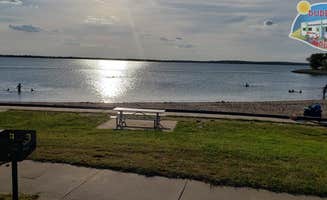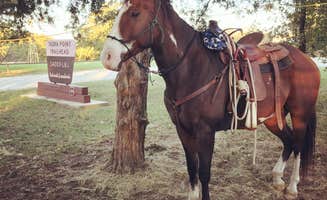Equestrian camping areas near Sadler, Texas offer diverse terrain for horse enthusiasts with varying skill levels. The region features both primitive camping in grasslands and developed sites with dedicated horse facilities. Winter temperatures average 35-55°F while summer months regularly exceed 90°F with high humidity, creating seasonal considerations for both horses and riders.
What to do
Trail riding through diverse ecosystems: At LBJ Lyndon B. Johnson National Grasslands, riders can explore varied terrain with limited facilities. As one visitor notes, "This place is free and close to DFW. There's cattle roaming around and a lot of stocked ponds to fish in and some hiking through the different areas."
Fishing from horseback-accessible shores: Lake Texoma provides excellent bank fishing opportunities directly from campsites. At Platter Flats, one camper mentioned, "There is a long equestrian trail that goes over to Lakeside Park across the lake that can also be hiked pretty easily that has a couple secluded spots to swim along the way."
Wildlife observation: Many equestrian camps provide opportunities to view local wildlife while riding. At Ray Roberts Lake State Park, campers report regular deer sightings with one visitor noting, "We have car camped on a few occasions here and each time we saw plenty of deer around camp."
What campers like
Spacious trailer parking: Ray Roberts Lake State Park Isle du Bois receives praise for its generous campsites. A recent visitor mentioned, "Campsites, large and private," which is essential for horse trailers and equipment.
Water access for horses: Many sites provide direct lake access for horses to cool off. According to a camper at Lake Murray, "Sites on the perimeter all have lake access where you can pull a boat up," which works equally well for allowing horses to cool down after rides.
Trail connectivity: The ability to ride directly from camp to trails is highly valued. As one Johnson Branch camper noted, "As we walked the perimeter of the park...we noticed that most all of the spots are great. On the other side of the cove, the lots are not quite as big, but the water is right outside your front door!"
Privacy between sites: Equestrian campers appreciate space between sites for horse containment. A camper at Ray Roberts described, "The primitive sites in the Hawthorne campgrounds are spaced a good distance apart and really give you a feel of isolation."
What you should know
High-line requirements: Many primitive camping areas require bringing your own horse containment systems. At LBJ Grasslands, one rider advised, "this campground is great for hitching up a high line for your ponies and spending the weekend hitting the trails."
Water availability varies significantly: Not all horse camping areas provide water access for animals. A visitor at LBJ Grasslands mentioned, "you'll have to haul water to your site from the water trough."
Seasonal road conditions: Dirt and gravel roads at horse camps can become difficult after rain. At East Fork Park, a camper warned, "It looks like there could be a lot of water pooled on and behind our site with a heavy rain."
Reservation requirements: Most equestrian sites require advance booking. A Lake Murray visitor advised, "Reservations easily made online. Chose a nice spot adjacent to the Lake."
Tips for camping with families
Child-friendly amenities: Look for campgrounds with playgrounds near horse areas. At Pilot Knoll Park, a camper mentioned, "There is also a small playground with slides and climbing structures across from the restrooms. My youngest was super excited to see a little library set up at the playground."
Educational opportunities: Some parks offer nature programs specifically for young riders. A Johnson Branch visitor shared, "We camped with Cub Scouts. It's was very windy but we had loads of fun! We learned what native plants we can eat!"
Safety considerations: Keep children away from unfamiliar horses at shared facilities. At Lone Oak RV Park, a camper noted, "They've got lemurs, a kangaroo, bunnies, a zebra, a camel and all the farm animals! Cannot say enough about the food at the restaurant, which they will deliver to your campsite."
Tent pads for non-riders: Many sites accommodate both equestrians and non-riders. A visitor to Ray Roberts observed, "The tent pad was big enough for a 6 man tent and a four man tent, with room to spare, which was nice."
Tips from RVers
Site selection for horse trailers: RVers with horse trailers should look for pull-through sites. A camper at Platter Flats Campground noted, "Having horses is not a requirement to camp in the equestrian area and that is handy when the 'regular' area is filled."
Hookup variations: Electricity requirements for RV cooling systems vary by season. According to an East Fork Park camper, "RV sites have water and 50/30 amp electric and there are 12 tent sites. We had a nice view of Lake Lavon."
Dust mitigation strategies: In equestrian areas with heavy traffic, dust can become problematic. A visitor to Platter Flats observed, "The equestrian camp area has dirt/gravel road and all the traffic creates a dusty environment."



